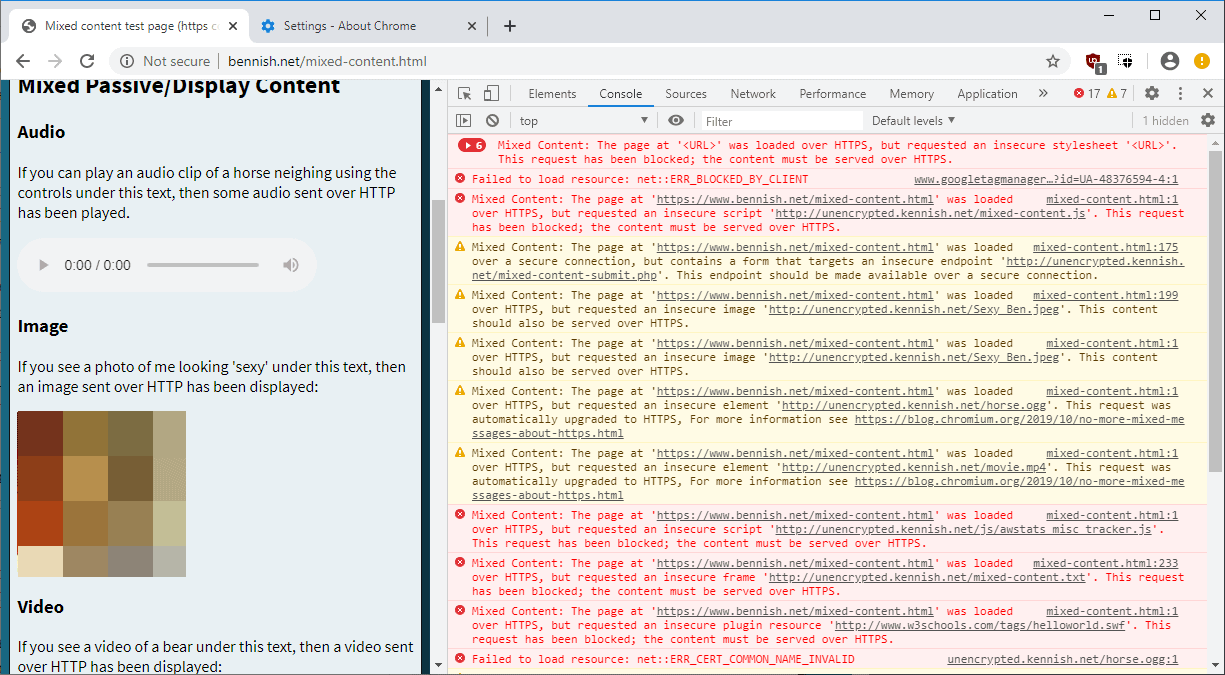Chrome 81: mixed content images will be upgraded or blocked

Google announced in late 2019 that it will change how the company's Chrome web browser handles mixed content. Mixed content refers to insecure content being loaded on secure sites; a basic example is a site that is accessible via HTTPS but loads some elements, e.g. images or scripts, from an insecure source, e.g. HTTP. One of the main issues with insecure content is that insecure content can be manipulated.
Tip: if you want to find out how your browser handles mixed content, load this mixed content test page to find out about it. You may need to open the Developer Tools (using F12) and open the Console to see if audio, video, and image content was upgraded by the browser automatically.

The Chrome browser blocks dynamic content, e.g. iFrame or script content, already if it is loaded from an insecure source. Insecure downloads will also be blocked in coming versions of the Chrome browser.
Google introduced new auto-upgrade and blocking functionality of mixed content in Chrome 80 which it released in February 2020. Chrome 80 attempts to upgraded audio and video content that is loaded via HTTP on HTTPS sites so that the content is also delivered using HTTPS. If that fails, the media is blocked in the browser instead.
Starting in Chrome 81, Google Chrome will do the same for images. If images are encountered on HTTPS webpages that are loaded via HTTP, Chrome will attempt to upgrade those. If that fails, Chrome will block these images so that they won't be loaded anymore.
The Chrome Platform Status listing highlights that the change will be made in all Chrome versions (Chrome for desktop and Android, as well as Android WebView).
This feature will autoupgrade optionally-blockable mixed content (HTTP content in HTTPS sites) by rewriting the URL to HTTPS, without a fallback to HTTP if the content is not available over HTTPS. Image mixed content autoupgrades are targeted for M81.
Chrome attempts to upgrade the elements automatically but will block them if that fails as some sites may already support serving the insecure content via HTTPS but don't due to configuration issues or other issues. It is still likely that Chrome users may run into issues from time to time with content that is not loaded anymore once Chrome is upgraded to version 81.
Google plans to release Chrome 81 next week and skip Chrome 82 to jump directly to Chrome 83 at the end of May 2020. Please note that the change has not yet landed in recent versions of the browser and that it is possible that it will be postponed.



















The latest release of Chrome 80 on Chromebooks is blocking certain Youtube videos with the comment “Use GSuite account”
The test below is better:
https://browserleaks.com/ssl
With my New Moon all Mixed Content Handling Tests are blocked.
Firefox already did the same thing
https://www.ghacks.net/2020/03/24/firefox-76-gets-optional-https-only-mode/
BUT … BUT … Mozilla is always copying Google RIGHT??? (says the shills).
leslie, you’re posting the truth, it doesn’t match the fake narrative of the Google shills.
Thanks for posting the comment leslie!
@notanon
Chrome 81 and Firefox 76 will literally be released in the same week, not sure what you are on about. It seems like some form of coordination happens between Google and Mozilla here (color me surprised, there is a business relationship between the two entities, after all).
I’m wondering what, if anything, will appear in place of the blocked content.
Just an empty space? Or will Chrome display a message about why the content isn’t appearing, to help web developers troubleshoot the issue? Will tech-savvy non-developers be able to distinguish between content blocked by this new policy, vs. content blocked by (for example) uBlock Origin?
Also, where does Firefox (now or in future releases) stand on this issue?
You’d have to update the roadmap which is Chromium version per [x] month. Easier to just skip it. Although they could have released a dummy v82, which would still be v81.
This is going to screw up a lot of websites.
And they are jumping from Chrome 81 to Chrome 83? Who do they think they are, Microsoft?
I download a lot of content…and sure…mostly from illegal streaming sites which are prominent across the internet….but, I pay for the bandwidth I use, and well, the sites are free, and with a decent ad-blocker…that is my entertainment along with free sports streaming.
Sounds to me that corporations are speaking up, and Google is listening…and will continue to moderate the internet.
Still don’t get the whole skipping a version, why not just slow the progression of the releases? I never got the whole release cadence anyway, why not just release on a as needed basis? I liked Firefox until it became obsessed with a planned rapid release schedule. Giving developers a forced schedule never really works well.
@JohnIL, some people are really dumb, they think that the higher the number (version) the better the browsers.
Chrome’s current stable release is Chrome 80, Firefox’s current stable release is Firefox 74. So to the tards, 80 > 74, ergo, Chrome > Firefox.
Google doesn’t want Mozilla to “catch up” or their retarded user base might switch to Firefox.
Sounds really dumb, but there are some really stupid people out there.
I’m pretty sure that the last good Firefox release was forty-something (the last one I used), back when it was still XUL-based, back when Mozilla cared about what its users wanted. Every increment since has been a step down, not up.